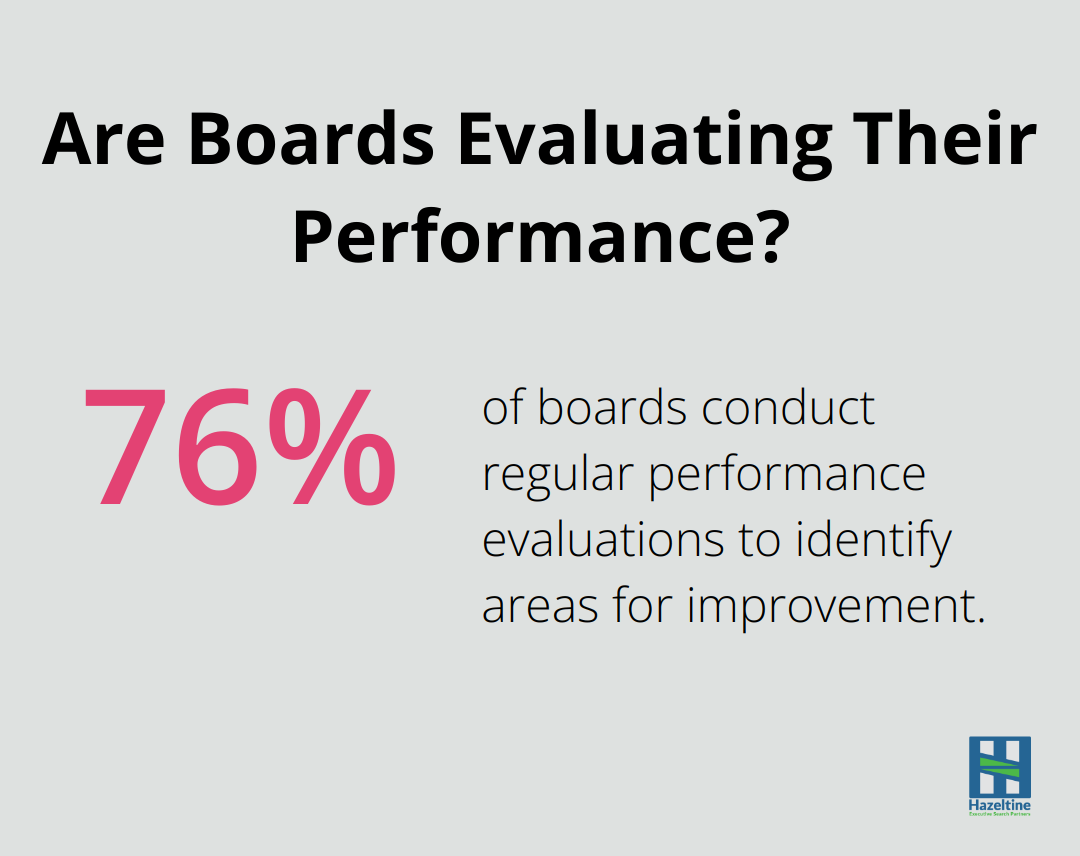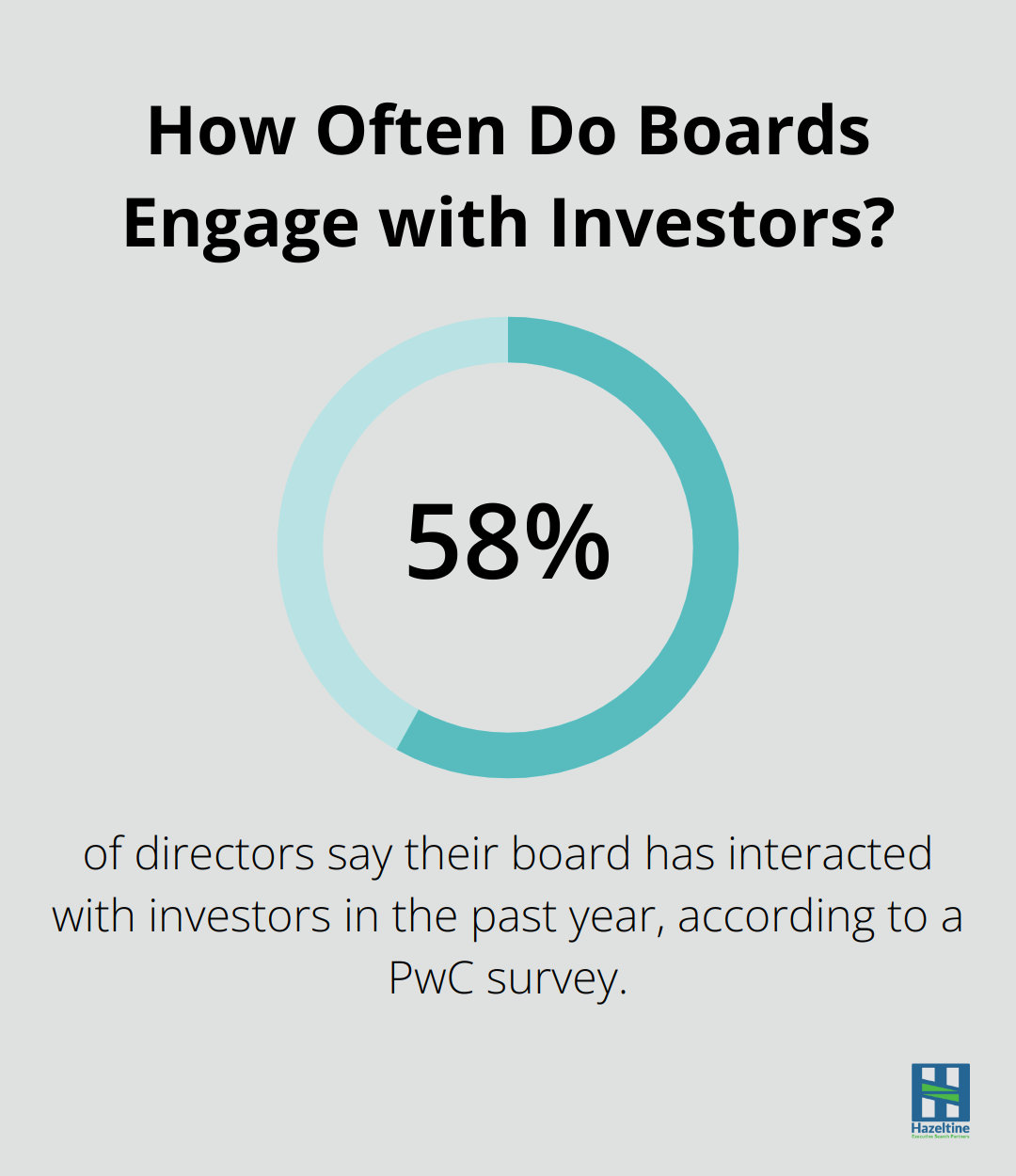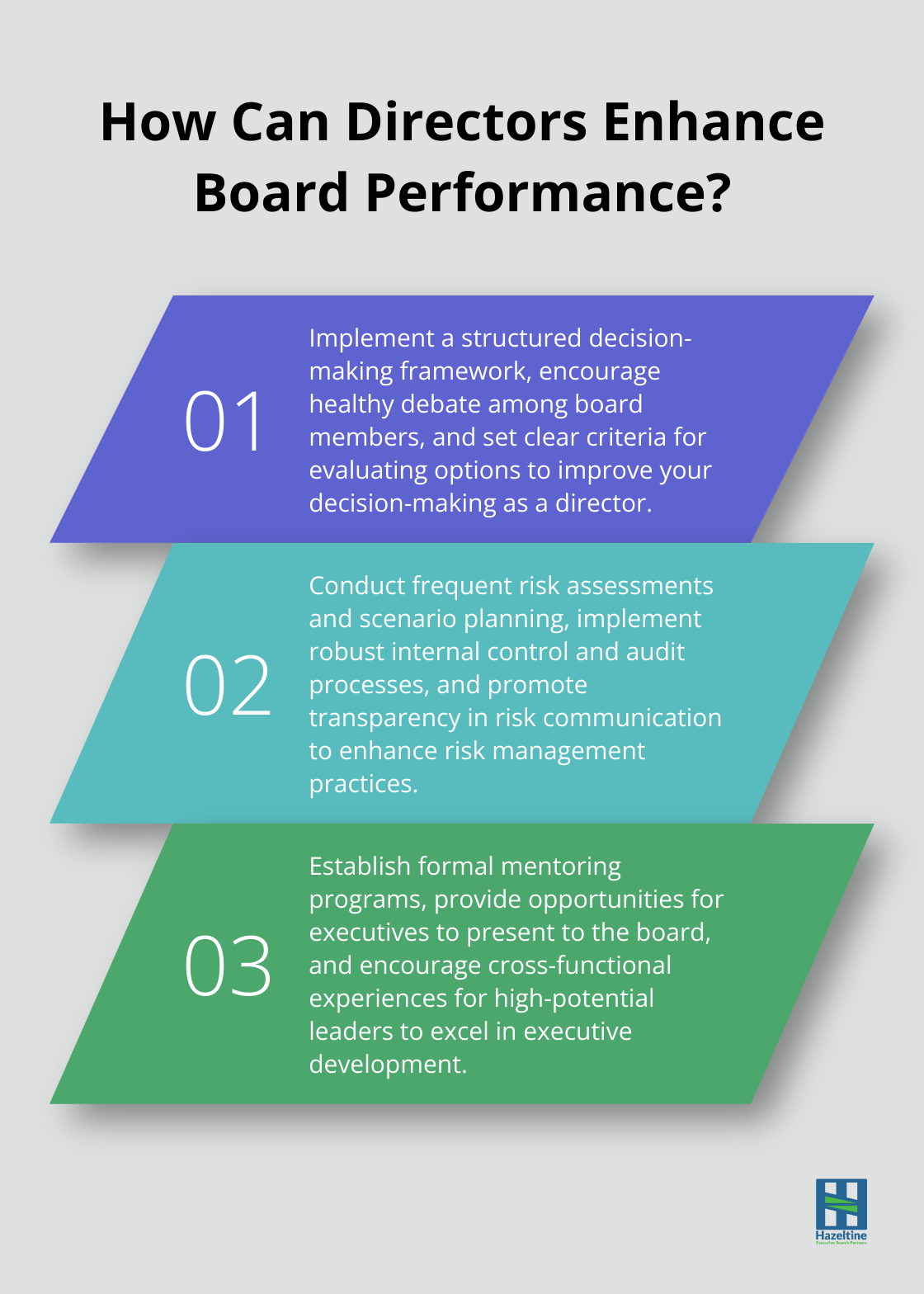The role of a director is complex and demanding, requiring a unique blend of skills and qualities.
In this blog, we’ll explore the key factors to become an excellent director, drawing from our experience in executive recruitment.
We’ll cover essential leadership skills, board governance responsibilities, and relationship-building strategies that set top directors apart.
What Makes an Effective Director?
Leadership skills form the foundation of an excellent director. The most successful directors possess a unique blend of strategic thinking, decisive action, and adaptability.
Strategic Vision: Seeing Beyond the Horizon
Top directors excel at seeing the big picture. They don’t just react to current market conditions; they anticipate future trends and position their organizations accordingly. A study by McKinsey found that companies with strong, forward-thinking boards were 2.4 times more likely to report above-median financial performance.

To sharpen your strategic thinking:
- Analyze industry reports and economic forecasts regularly
- Engage in scenario planning exercises
- Seek diverse perspectives from both inside and outside your industry
Decisive Action: Making Tough Calls
Effective directors don’t shy away from difficult choices. They gather relevant data, consider multiple viewpoints, and act decisively. Most directors have a positive view of current board practices and feel they have sufficient time to prepare for meetings and committee work.
To improve your decision-making:
- Implement a structured decision-making framework
- Encourage healthy debate among board members
- Set clear criteria for evaluating options
Adaptability: Thriving in Uncertainty
In today’s fast-paced business environment, adaptability is essential. The best directors feel comfortable with uncertainty and can guide their organizations through periods of change. According to a Deloitte study, 87% of companies believe that agility is critical to success in the digital age.
To enhance your adaptability:
- Stay informed about emerging technologies and their potential impact
- Foster a culture of innovation within your organization
- Be ready to pivot strategies when market conditions shift
Continuous Learning: Staying Ahead of the Curve
Exceptional directors never stop learning. They actively seek out new knowledge and experiences to broaden their perspectives. This commitment to growth allows them to bring fresh insights to their roles and stay ahead of industry trends.
Try these strategies to foster continuous learning:
- Attend industry conferences and workshops
- Join professional networks and engage in peer discussions
- Read widely (both within and outside your field)
Directors who excel in these areas position themselves well to lead their organizations to success. However, leadership skills represent just one piece of the puzzle. The next section will explore the critical responsibilities of board governance and how top directors navigate these challenges.
Navigating Board Governance
Fiduciary Duties: The Foundation of Trust
Directors must fulfill their fiduciary duties to protect organizational and stakeholder interests. These duties include care and loyalty, and directors are expected to carry out their obligations in good faith.

To strengthen fiduciary oversight:
- Monitor the organization’s financial health and operations closely
- Review and update governance policies regularly
- Participate in ongoing legal and regulatory education
Risk Management: Anticipating Challenges
Top directors take a proactive stance on risk management. They identify threats and opportunities, develop mitigation strategies, and oversee implementation. A PwC survey reveals that roughly three-quarters of directors say their boards have discussed the company’s crisis response plan in the event of a major security breach.
To improve risk management:
- Conduct frequent risk assessments and scenario planning
- Implement robust internal control and audit processes
- Promote transparency in risk communication
Stakeholder Engagement: Balancing Diverse Interests
Successful directors navigate complex stakeholder relationships (including shareholders, employees, customers, and communities). The Business Roundtable emphasizes that companies should create value for all stakeholders, not just shareholders.
To balance stakeholder interests effectively:
- Create a comprehensive engagement strategy
- Seek feedback from diverse stakeholder groups
- Integrate stakeholder concerns into strategic decisions
Ethical Leadership: Setting the Tone
Directors play a vital role in shaping organizational culture and ethics. They set standards for behavior and ensure compliance with legal and ethical norms. A study by Deloitte found that 87% of employees believe ethical leadership is essential for long-term business success.
To foster ethical leadership:
- Establish and communicate clear ethical guidelines
- Lead by example in decision-making and behavior
- Implement robust whistleblower protection and reporting mechanisms
Continuous Improvement: Evolving with the Times
Effective directors recognize the need for ongoing board development. They actively seek opportunities to enhance their skills and knowledge. A Spencer Stuart survey indicates that 76% of boards conduct regular performance evaluations to identify areas for improvement.
To promote continuous improvement:
- Participate in board education programs
- Conduct regular board performance assessments
- Stay informed about emerging governance best practices
Directors who excel in these areas of board governance position their organizations for long-term success. However, governance represents only one aspect of effective directorship. The next section will explore how top directors build and maintain crucial relationships that drive organizational performance.
Building Relationships for Board Success
Foster Board Collaboration
Successful directors cultivate a collaborative board culture. They encourage open dialogue, respect diverse viewpoints, and work towards consensus. A study by the Harvard Business Review found that boards with strong collaborative dynamics were 3.5 times more likely to outperform their peers.

To enhance board collaboration:
- Implement regular team-building activities
- Rotate committee assignments to broaden perspectives
- Create opportunities for informal interactions outside of board meetings
Engage Shareholders Effectively
Directors play a key role in shareholder communication. They must balance transparency with strategic discretion. A PwC survey revealed that 58% of directors say their board has interacted with investors in the past year (up from 42% in 2018).
Strategies for effective shareholder engagement:
- Develop a clear communication plan with management
- Address potential concerns proactively
- Use technology for more frequent and accessible updates
Nurture Executive Talent
Top directors recognize their role in developing the next generation of leaders. They mentor executives, provide constructive feedback, and help shape succession plans. A Deloitte study found that organizations with strong leadership development programs are 2.4 times more likely to meet or exceed financial targets.
To excel in executive development:
- Establish formal mentoring programs
- Provide opportunities for executives to present to the board
- Encourage cross-functional experiences for high-potential leaders
Build External Partnerships
Effective directors leverage their networks to create value for the organization. They forge strategic partnerships, identify potential collaborators, and stay informed about industry trends. These external relationships can lead to new opportunities and insights that benefit the company.
Try these strategies to build external partnerships:
- Attend industry conferences and events
- Join professional associations related to your industry
- Participate in cross-sector initiatives or think tanks
Cultivate Stakeholder Relationships
Directors must consider the interests of various stakeholders (including employees, customers, and communities). They work to balance these diverse needs while ensuring the organization’s long-term success. The Business Roundtable emphasizes that companies should create value for all stakeholders, not just shareholders.
To improve stakeholder relationships:
- Develop a comprehensive stakeholder engagement strategy
- Seek regular feedback from different stakeholder groups
- Integrate stakeholder concerns into board discussions and decision-making processes
Final Thoughts
Excellent directors possess a unique blend of leadership skills, governance expertise, and relationship-building abilities. These key factors to become an excellent director enable them to navigate complex challenges and guide organizations toward long-term success. Directors who excel in board governance fulfill their fiduciary duties, manage risks proactively, and balance diverse stakeholder interests.

The impact of outstanding directors on organizational success cannot be overstated. They drive strategic growth, ensure sound governance practices, and cultivate a pipeline of future leaders. Top directors recognize the importance of building strong relationships with fellow board members, shareholders, executives, and external partners (including industry associations and thought leaders).
At Hazeltine Executive Search, we understand the critical role that exceptional directors play in organizational success. Our expertise in connecting top talent with leading organizations across various sectors helps identify and place directors who possess these essential qualities. As the business landscape evolves, the demand for excellent directors will only increase, making ongoing development and effective governance priorities for those who aspire to make significant contributions to their organizations and industries.








